一般现在时用法专练
- 格式:doc
- 大小:19.50 KB
- 文档页数:4
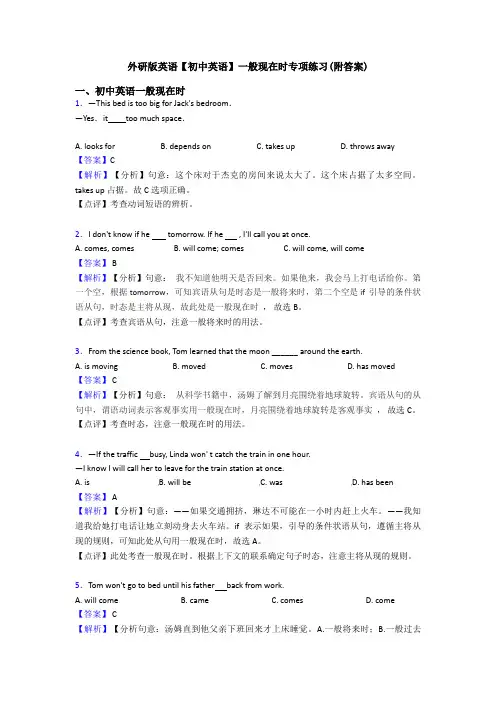
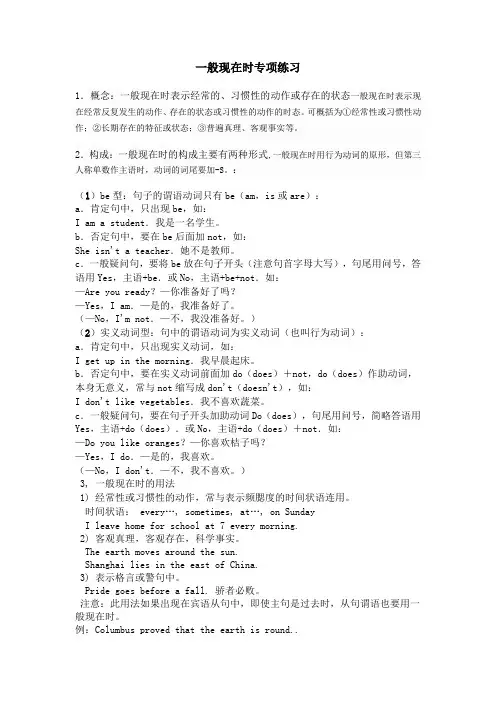
一般现在时专项练习1.概念:一般现在时表示经常的、习惯性的动作或存在的状态一般现在时表示现在经常反复发生的动作、存在的状态或习惯性的动作的时态。
可概括为①经常性或习惯性动作;②长期存在的特征或状态;③普遍真理、客观事实等。
2.构成:一般现在时的构成主要有两种形式,一般现在时用行为动词的原形,但第三人称单数作主语时,动词的词尾要加-S。
:(1)be型:句子的谓语动词只有be(am,is或are):a.肯定句中,只出现be,如:I am a student.我是一名学生。
b.否定句中,要在be后面加not,如:She isn't a teacher.她不是教师。
c.一般疑问句,要将be放在句子开头(注意句首字母大写),句尾用问号,答语用Yes,主语+be.或No,主语+be+not.如:—Are you ready?—你准备好了吗?—Yes,I am.—是的,我准备好了。
(—No,I'm not.—不,我没准备好。
)(2)实义动词型:句中的谓语动词为实义动词(也叫行为动词):a.肯定句中,只出现实义动词,如:I get up in the morning.我早晨起床。
b.否定句中,要在实义动词前面加do(does)+not,do(does)作助动词,本身无意义,常与not缩写成don't(doesn't),如:I don't like vegetables.我不喜欢蔬菜。
c.一般疑问句,要在句子开头加助动词Do(does),句尾用问号,简略答语用Yes,主语+do(does).或No,主语+do(does)+not.如:—Do you like oranges?—你喜欢桔子吗?—Yes,I do.—是的,我喜欢。
(—No,I don't.—不,我不喜欢。
)3, 一般现在时的用法1) 经常性或习惯性的动作,常与表示频腮度的时间状语连用。
时间状语:every…, sometimes, at…, on SundayI leave home for school at 7 every morning.2) 客观真理,客观存在,科学事实。
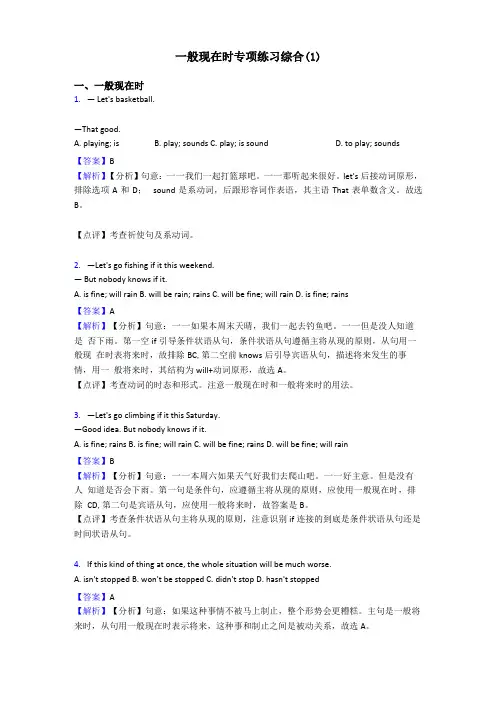
一般现在时专项练习综合(1)一、一般现在时1.— Let's basketball.—That good.A. playing; isB. play; soundsC. play; is soundD. to play; sounds【答案】B【解析】【分析】句意:一一我们一起打篮球吧。
一一那听起来很好。
let's后接动词原形,排除选项A和D;sound是系动词,后跟形容词作表语,其主语That表单数含义。
故选B。
【点评】考查祈使句及系动词。
2.—Let's go fishing if it this weekend.— But nobody knows if it.A. is fine; will rainB. will be rain; rainsC. will be fine; will rainD. is fine; rains【答案】A【解析】【分析】句意:一一如果本周末天晴,我们一起去钓鱼吧。
一一但是没人知道是否下雨。
第一空if引导条件状语从句,条件状语从句遵循主将从现的原则,从句用一般现在时表将来时,故排除BC,第二空前knows后引导宾语从句,描述将来发生的事情,用一般将来时,其结构为will+动词原形,故选A。
【点评】考查动词的时态和形式。
注意一般现在时和一般将来时的用法。
3.—Let's go climbing if it this Saturday.—Good idea. But nobody knows if it.A. is fine; rainsB. is fine; will rainC. will be fine; rainsD. will be fine; will rain【答案】B【解析】【分析】句意:一一本周六如果天气好我们去爬山吧。
一一好主意。
但是没有人知道是否会下雨。
第一句是条件句,应遵循主将从现的原则,应使用一般现在时,排除CD,第二句是宾语从句,应使用一般将来时,故答案是B。
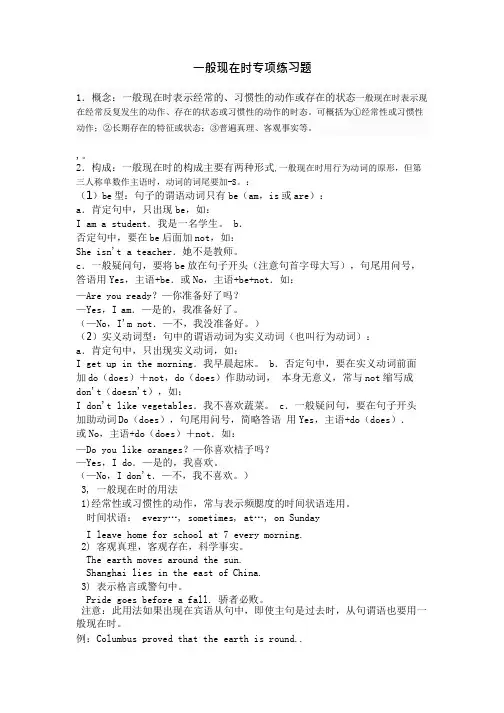
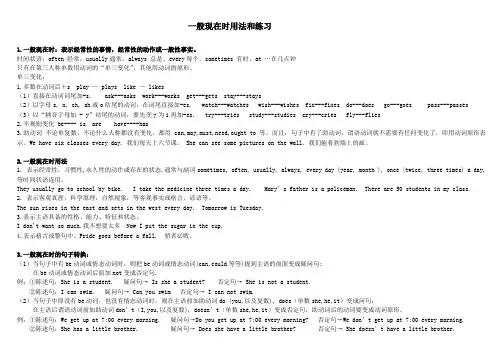
一般现在时用法和练习1.一般现在时:表示经常性的事情,经常性的动作或一般性事实。
时间状语:often 经常,usually通常,always 总是,every每个,sometimes 有时,at …在几点钟只有在第三人称单数用动词的“单三变化”,其他用动词的原形。
单三变化:1.多数在动词后+s play — plays like — likes(1)直接在动词词尾加-s. ask---asks work---works get---gets stay---stays(2)以字母s, x, ch, sh或o结尾的动词,在词尾直接加-es. watch---watches wish---wishes fix---fixes do---does go---goes pass---passes (3)以“辅音字母加 - y”结尾的动词,要先变y为i再加-es. try---tries study---studies cry---cries fly---flies2.不规则变化 be---- is are have----has3.助动词不论单复数、不论什么人称都没有变化,都用 can,may,must,need,ought to 等。
而且,句子中有了助动词,谓语动词就不需要有任何变化了,即用动词原形表示。
We have six classes every day. 我们每天上六节课。
She can see some pictures on the wall. 我们能看到墙上的画。
2.一般现在时用法1. 表示经常性,习惯性,永久性的动作或存在的状态.通常与副词sometimes, often, usually, always, every day (year, month ), once (twice, three times) a day,等时间状语连用。
They usually go to school by bike. I take the medicine three times a day. Mary’s father is a policeman. There are 50 students in my class.2. 表示客观真理,科学原理,自然现象,等客观事实或格言,谚语等。
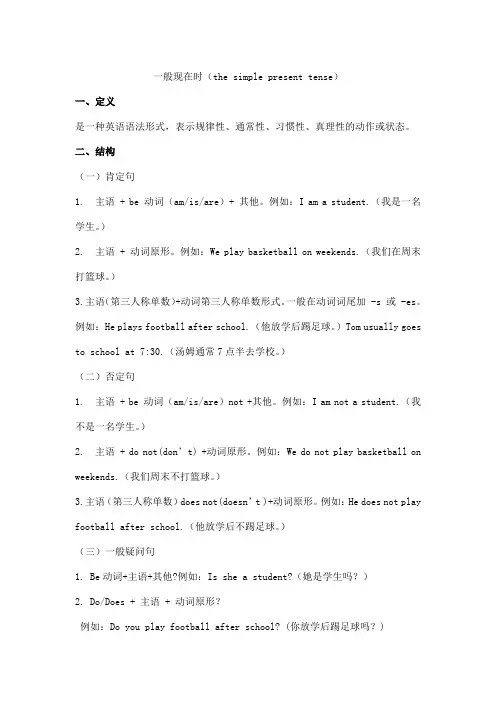
一般现在时(the simple present tense)一、定义是一种英语语法形式,表示规律性、通常性、习惯性、真理性的动作或状态。
二、结构(一)肯定句1. 主语 + be 动词(am/is/are)+ 其他。
例如:I am a student.(我是一名学生。
)2. 主语 + 动词原形。
例如:We play basketball on weekends.(我们在周末打篮球。
)3.主语(第三人称单数)+动词第三人称单数形式。
一般在动词词尾加 -s 或 -es。
例如:He plays football after school.(他放学后踢足球。
)Tom usually goes to school at 7:30.(汤姆通常7点半去学校。
)(二)否定句1. 主语 + be 动词(am/is/are)not +其他。
例如:I am not a student.(我不是一名学生。
)2. 主语 + do not(don’t) +动词原形。
例如:We do not play basketball on weekends.(我们周末不打篮球。
)3.主语(第三人称单数)does not(doesn’t )+动词原形。
例如:He does not play football after school.(他放学后不踢足球。
)(三)一般疑问句1. Be动词+主语+其他?例如:Is she a student?(她是学生吗?)2. Do/Does + 主语 + 动词原形?例如:Do you play football after school? (你放学后踢足球吗?)Does he work here? (他在这里工作吗?)三、用法1. 描述习惯或重复动作:常与表示频率的时间状语连用。
例如:I get up at 6 o'clock every morning. (我每天早上六点起床。
)He goes to school by bus. (他乘公共汽车上学。
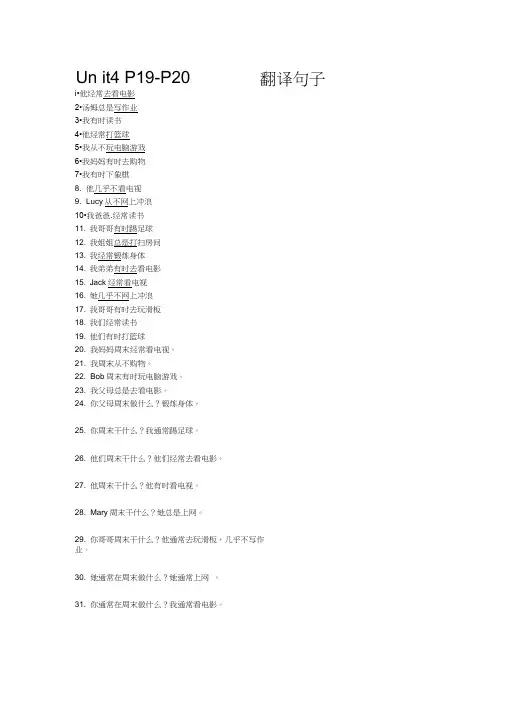
Un it4 P19-P20 翻译句子i•他经常去看电影
2•汤姆总是写作业
3•我有时读书
4•他经常打篮球
5•我从不玩电脑游戏
6•我妈妈有时去购物
7•我有时下象棋
8. 他几乎不看电视
9. Lucy从不网上冲浪
10•我爸爸.经常读书
11. 我哥哥有时踢足球
12. 我姐姐总是打扫房间
13. 我经常锻炼身体
14. 我弟弟有时去看电影
15. Jack经常看电视
16. 她几乎不网上冲浪
17. 我哥哥有时去玩滑板
18. 我们经常读书
19. 他们有时打篮球
20. 我妈妈周末经常看电视。
21. 我周末从不购物。
22. Bob周末有时玩电脑游戏。
23. 我父母总是去看电影。
24. 你父母周末做什么?锻炼身体。
25. 你周末干什么?我通常踢足球。
26. 他们周末干什么?他们经常去看电影。
27. 他周末干什么?他有时看电视。
28. Mary周末干什么?她总是上网。
29. 你哥哥周末干什么?他通常去玩滑板,几乎不写作
业。
30. 她通常在周末做什么?她通常上网。
31. 你通常在周末做什么?我通常看电影。
32. Bob周末干什么?他经常上网。
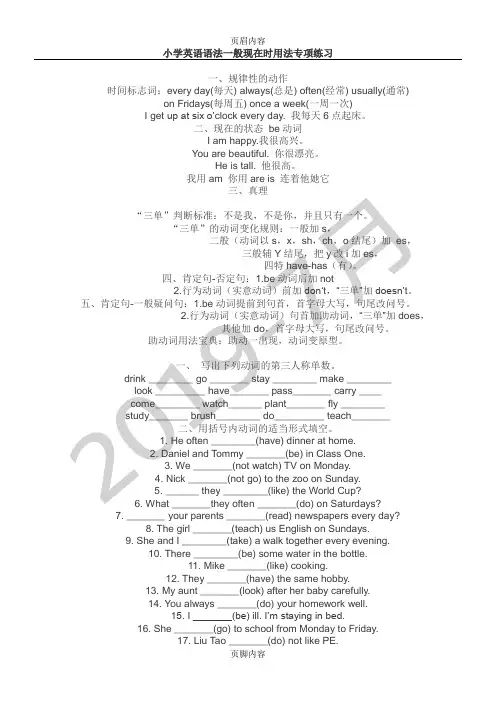
小学英语语法一般现在时用法专项练习一、规律性的动作时间标志词:every day(每天) always(总是) often(经常) usually(通常)on Fridays(每周五) once a week(一周一次)I get up at six o’clock every day. 我每天6点起床。
二、现在的状态be动词I am happy.我很高兴。
You are beautiful. 你很漂亮。
He is tall. 他很高。
我用am 你用are is 连着他她它三、真理“三单”判断标准:不是我,不是你,并且只有一个。
“三单”的动词变化规则:一般加s,二般(动词以s,x,sh,ch,o结尾)加es,三般辅Y结尾,把y改i加es,四特have-has(有)。
四、肯定句-否定句:1.be动词后加not2.行为动词(实意动词)前加don‘t,“三单”加doesn’t。
五、肯定句-一般疑问句:1.be动词提前到句首,首字母大写,句尾改问号。
2.行为动词(实意动词)句首加助动词,“三单”加does,其他加do,首字母大写,句尾改问号。
助动词用法宝典:助动一出现,动词变原型。
一、写出下列动词的第三人称单数。
drink ________ go _______ stay ________ make ________look _________ have_______ pass_______ carry ____come________ watch______ plant_______ fly ________study_______ brush________ do_________ teach_______二、用括号内动词的适当形式填空。
1. He often ________(have) dinner at home.2. Daniel and Tommy _______(be) in Class One.3. We _______(not watch) TV on Monday.4. Nick _______(not go) to the zoo on Sunday.5. ______ they ________(like) the World Cup?6. What _______they often _______(do) on Saturdays?7. _______ your parents _______(read) newspapers every day?8. The girl _______(teach) us English on Sundays.9. She and I ________(take) a walk together every evening.10. There ________(be) some water in the bottle.11. Mike _______(like) cooking.12. They _______(have) the same hobby.13. My aunt _______(look) after her baby carefully.14. You always _______(do) your homework well.15. I _______(be) ill. I’m staying in bed.16. She _______(go) to school from Monday to Friday.17. Liu Tao _______(do) not like PE.18. The child often _______(watch) TV in the evening.19. Su Hai and Su Yang _______(have) eight lessons this term.20. -What day _______(be) it today?- It’s Saturday.三、按照要求改写句子。
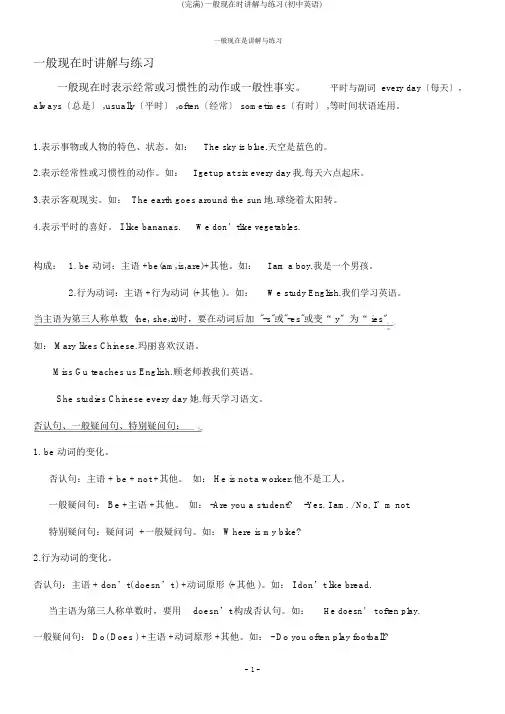
一般现在是讲解与练习一般现在时讲解与练习一般现在时表示经常或习惯性的动作或一般性事实。
平时与副词 every day〔每天〕,always〔总是〕 ,usually〔平时〕 ,often〔经常〕 sometimes〔有时〕 ,等时间状语连用。
1.表示事物或人物的特色、状态。
如:The sky is blue.天空是蓝色的。
2.表示经常性或习惯性的动作。
如:I get up at six every day我.每天六点起床。
3.表示客观现实。
如: The earth goes around the sun地.球绕着太阳转。
4.表示平时的喜好。
I like bananas.We don’tlike vegetables.构成: 1. be 动词:主语 +be(am,is,are)+其他。
如:I am a boy.我是一个男孩。
2.行为动词:主语 +行为动词 (+其他 )。
如:We study English.我们学习英语。
当主语为第三人称单数 (he, she,it)时,要在动词后加 "-s"或"-es"或变“ y〞为“ ies〞如: Mary likes Chinese.玛丽喜欢汉语。
Miss Gu teaches us English.顾老师教我们英语。
She studies Chinese every day她.每天学习语文。
否认句、一般疑问句、特别疑问句:1. be 动词的变化。
否认句:主语 + be + not +其他。
如: He is not a worker.他不是工人。
一般疑问句: Be +主语 +其他。
如: -Are you a student?-Yes. I am. / No, I’m not.特别疑问句:疑问词 +一般疑问句。
如: Where is my bike?2.行为动词的变化。
否认句:主语 + don’t( doesn’t ) +动词原形 (+其他 )。
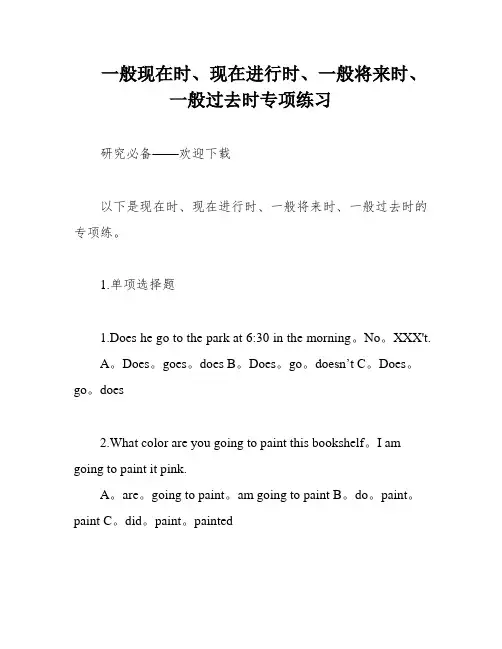
一般现在时、现在进行时、一般将来时、一般过去时专项练习研究必备——欢迎下载以下是现在时、现在进行时、一般将来时、一般过去时的专项练。
1.单项选择题1.Does he go to the park at 6:30 in the morning。
No。
XXX't.A。
Does。
goes。
does B。
Does。
go。
doesn’t C。
Does。
go。
does2.What color are you going to paint this bookshelf。
I am going to paint it pink.A。
are。
going to paint。
am going to paint B。
do。
paint。
paint C。
did。
paint。
painted3.Tim always draws a picture at home。
He is drawing a car now.A。
draws。
is drawing B。
draw。
draw C。
draws。
draw4.XXX.A。
see。
drink B。
sees。
drinks C。
sees。
drink5.XXX。
XXX.A。
wash。
XXX。
XXX washing。
washes6.Mr。
Green usually reads his XXX。
XXX with his wife.A。
reads。
watches B。
reads。
will watch C。
reads。
watched7.Where are the man and the woman。
They are sitting near the tree.A。
XXX sitting8.Is your pen pal into diving。
No。
he isn't。
He is into writing stories.A。
Is。
into。
isn't。
is9.Did you go fishing yesterday。
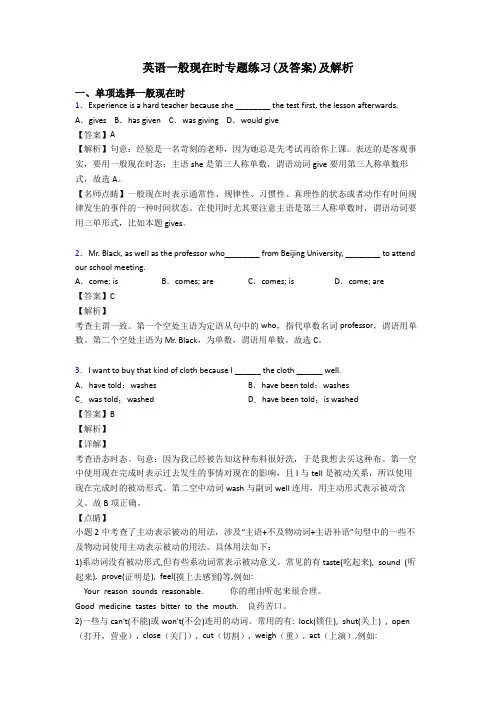
一般现在时专项练习(1)(一)单选:1. Where Lucy come from?A. doB. doesC. isD. are2. Most of the students China.A. comes fromB. is fromC. are fromD. come of3. We speak English .A. every daysB. everydayC. very dayD. every day4. My math teacher a big pair of glasses.A. wearsB. put onC. wearD. puts on5. What your father and mother ?A. does, doB. do, doC. are, doD. do, does(二)用动词适当形式填空:1. His radio is broken. It (sound) terrible.2. Did somebody drop water on the rug? It (look) wet.3. Every year my parents (give) me a present for my birthday.4. The club (send) her a letter every month.5. your dad (wash) his car once a week? Yes, he does.6. Lin Tao is a good student. He (study) very hard.7. They ( work) at the bank.(三)句型转换:1. My living room has three windows. (改为否定句)2. Jim and Jack like swimming on Sundays.(就划线部分提问)3. We are in the same class. (改为一般疑问句)4. He comes from England.(就划线部分提问)一、用所给动词的适当形式填空。
(一)单选:1. WhereLucy come from?A. doB. doesC. isD. are3. We speakEnglis h .A. everydaysB. everyd ayC. very dayD. everyday4. My math teache r a big pair of glasse s.A. wearsB. put onC. wearD. puts on5. What your father and mother?A. does, doB. do, doC. are, doD. do, does (二)用动词适当形式填空:1. His radiois broken. It (sound) terrib le.2. Did somebo dy drop wateron the rug? It (look)wet.3. Everyyear my parent s (give) me a presen t for my birthd ay.4. The club (send) her a letter everymonth.5. your dad (wash)his car once a week? Yes, he does.6. Lin Tao is a good studen t. He (study)very hard.7. They (work)at the bank.(三)句型转换:1. My living room has threewindow s. (改为否定句)2. Jim and Jack like swimmi ng on Sunday s.(就划线部分提问)3. We are in the same class.(改为一般疑问句)4. He comesfrom Englan d.(就划线部分提问)一、用所给动词的适当形式填空。
一般现在时专项训练一、选择题1. Tom is a worker. He _______ in a factory. His sisters _______ in a hospital. A. work; work B. works; workC. work; worksD. works; works2. We _______ our English teacher and often _______ to her .A. like; listenB. likes; listensC. like; are listeningD. are liking;listen3. She _______ up at six in the morning .A. getB. getsC. gettingD. is getting4. On Sunday he sometimes _______ his clothes and sometimes _______ some shopping.A. wash; doB. washes; doesC. is washing; is doingD. washed; did5. They _______ TV in the evening. They do their homework.A. are watchingB. can’ t watchingC. don ’ t watchD. don’ t watching6. He said the sun _______ in the east and _______ in the west.A. rose; setB. rises; setsC. rises; setD. rise; sets7. Wang Mei music and often to music .A. like; listenB. likes; listensC. like; are listeningD. liking; listen8. Jenny _______ English every evening.A. has studyB. studie sC. studyD. studied9. Jenny _______ in an office. Her parents _______ in a hospital.A. work; worksB. works; workC. work; are workingD. is working; work10. One of the boys _______ a black hat.A. haveB. there isC. there areD. hasA. don ’ t rainB. didn’ t rainC. doesn ’ t rainD. isn’ t rain12. --- _______ are you eating?--- I ’ m eating _______ meat.A. What; someB. Which; anyC. Where; notD. What: a二、填空题13.We often _______ (play) on the playground.14.He usually _______ (get) up at six o’ clock.15._______ you _______ (brush) your teeth every morning?16.What _______ (do) he usually _______ (do) after school?17.Danny _______ (study) English, Chinese, maths, science and art at school.18.Mike sometimes _______ (go) to the park with his sister.19.At eight at night, she usually _______ (watch) TV with his parents.20._______ Mike _______ (read) English every day?21.How many lessons _______ your classmates _______ (have) on Monday?22.What time his mother _______ (do) the housework?23.He often _______ (have) dinner at home.24.Daniel and Tommy _______ (be) in Class One.25.Who _______ (dance) the best in your class?26.There _______ (be) a football match on TV every morning.27.Do they _______ (watch) the World Cup?参考答案1.【答案】 B【解析】思路分析:题干实际由三个陈述句组成。
一般现在时专项练习及答案一般现在时是英语中最基础的时间态之一,它用来描述经常发生的动作、事实、习惯或现有的状态。
在学习一般现在时时,我们需要掌握动词的变化规则以及它的正确用法。
本文将提供一些专项练习,并附上答案,以帮助大家更好地理解和运用一般现在时。
练习一:动词的正确形式填空1. My sister _________ (work) in a bank.2. Tom usually __________ (go) to school by bus.3. They _________ (like) to play basketball on weekends.4. I _________ (watch) TV every evening.5. We _________ (study) English at the moment.6. She _________ (not like) coffee.7. He _________ (play) the guitar very well.8. The sun _________ (rise) in the east.9. It _________ (snow) in winter.10. They _________ (visit) their grandparents every summer.答案:1. works2. goes3. like4. watch5. are studying6. doesn't like7. plays8. rises9. snows10. visit练习二:选择正确的谓语动词形式1. He always __________ (watch/watches) movies on weekends.2. The cat _________ (is/are) sleeping on the sofa.3. They _________ (doesn't/don't) like to eat spicy food.4. We usually _________ (go/goes) to the park after dinner.5. The train _________ (arrives/arrive) at 9 o'clock every morning.6. She _________ (plays/play) the piano very well.7. My parents _________ (work/works) in a hospital.8. The dog _________ (barks/bark) loudly every night.9. It _________ (rains/rain) a lot in this season.10. The students _________ (listens/listen) carefully in class.答案:1. watches2. is3. don't4. go5. arrives6. plays7. work8. barks9. rains10. listen练习三:改错题1. She studies English every day.2. I am not like vegetables.3. The sun rises in the west.4. They doesn't play basketball.5. He usually takes the train to work.6. The birds fly in the sky.7. My brother like playing soccer.8. She don't have any siblings.9. It snowing heavily outside.10. We watches TV in the evening.答案:1. 正确2. am not likes3. rises in the east4. doesn't play5. 正确6. fly in the sky7. likes playing soccer8. doesn't have any siblings9. is snowing heavily10. watch TV in the evening练习四:根据提示写句子1. Mary usually __________ (wake up) at 7 o'clock.2. They _________ (not eat) meat.3. Tom _________ (brush) his teeth before bed.4. The train __________ (leave) at 8:30.5. We __________ (not play) tennis on Sundays.6. She __________ (like) to read books.7. The students __________ (study) hard for the exam.8. It __________ (rain) a lot in this city.9. The dog always __________ (bark) at strangers.10. He __________ (not watch) TV in the morning.答案:1. wakes up2. don't eat3. brushes4. leaves5. don't play6. likes7. study8. rains9. barks10. doesn't watch掌握了一般现在时的基本用法和动词形式后,我们就能准确地描述日常生活中发生的动作、事实和习惯。
一般现在时用法专练
用括号内动词的适当形式填空。
1. He often ________(have) dinner at home
2. Daniel and Tommy _______(be) in Class One.
3. We _______(not watch) TV on Monday.
4.He ___________ (visit ) his grandparents .
5 _____your sister__________(know)English?
6Her home____ near her school. (be)
7The tall boy __________(not listen) to teacher.
8 Where _____you________(have)lunch every day?
9 Who________(想要 )to go swimming?
10 ______she________(do) the housework every day?
11 Jenny and Danny usually_________(play) games in the afternoon 用
所给的人称改写句子
1.I take photos on Sunday. ( Mike)
2.We grow beautiful flowers. (she)
2.They like collecting stamps.Ben4.I listen to music carefully. (my aunt)
3.You like making a model ship.(Helen) 6.We clean the classroom
every day.(he)
4.They look after照顾 the pandas.(Mr Wang)8.I draw a tree and some flowers.(Nancy)
5.We go to bed at eight( my sister)10.I read newspapers in the evening.(Mr Green)
将下列句子改成否定句、一般疑问句并作肯定、否定回答。
1. Lucy's friends play volleyball.
2. Tom has noodles for supper.
_____________________________ _____________________________
_____________________________ _____________________________
_____________________________ _____________________________
3. My uncle is good at drawing.擅长画画
4. Their father goes for a walk散步 every evening.
_____________________________ _____________________________
_____________________________ _____________________________
_____________________________ _____________________________
5. Kate likes tomatoes very much.
6. David has three nice backpacks.
_____________________________ _____________________________
_____________________________ _____________________________
_____________________________ _____________________________
1.He _____(be) an engineer.
2Mike________(go)to school at seven in the morning.
5.My mother________(like) ______(go) shopping.
7.She_________(make) a model plane.
8.Do you ________(like)_________(run)?
9.Does he_________(like)_________(jump) ?
10.Does Nancy_________(grow)flowers on Saturday ?
11.The teachers________(like)___________(dance).
12.The teacher________(want)____________(sing).
13.The students___________(speak) English in class.
14.The student_________(speak) Chinese after class.
15. Let's____________and play football . ( go )
16. He_____________ like swimming . ( not )
17. I'm sorry ____________that . ( hear )
20. _________you study English at school ? Yes , I_________. ( do )
21. ______your sister study English at school ? No , she________ . ( do )
1. There ________ (be) two pictures on the wall.
2. His classmate ________ (work) very hard on English.
3. Does the man ________ (want) to clean his car?
4. He doesn't ________ (like) apples very much.
5. My sister ________ (go) to Shanghai.
6. His sons ________ (do) the work well.
1 Do you often play football after school? 2. Gina's sister likes playing pingpong
_____________________________ _____________________________
_____________________________ _____________________________
3.She lives in a small town near New York 4 . I watch TV every day.
_____________________________ _____________________________
_____________________________ _____________________________
5. David has a new coat.
6.Nancy doesn't run fast
_____________________________ _____________________________
_____________________________ _____________________________
7.We have four lessons. 8. Mike has two letters for him.
_____________________________ _____________________________
_____________________________ _____________________________
9.I usually play football on Friday afternoon.10.Yang usually washes some clothes on Saturday.
_____________________________ _____________________________
_____________________________ _____________________________
11.He usually waters the flowers every day 12,Tom does his homework at home
_____________________________ _____________________________
_____________________________ _____________________________。